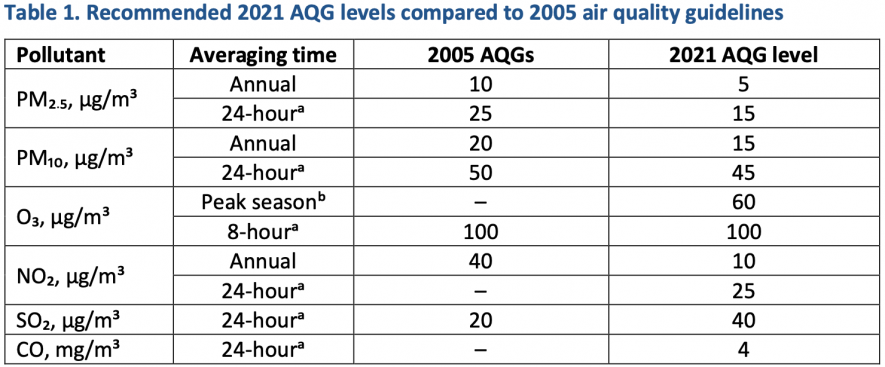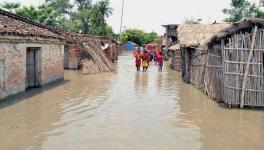As WHO Revises Air Quality Guidelines, India Also Needs to Update

Air pollution in Delhi. Image used for representational purpose only. | Image Courtesy: Wikimedia Commons
The World Health Organization (WHO) has issued new revised Global Air Quality Guidelines (AQGs), which is the first update since 2005. Taking the impact of air pollution on environment and human health seriously, the previous AQG levels have now been adjusted downwards with warning that exceeding the new air quality levels is associated with significant risks to health.

On WHO’s website, WHO Director-General, Dr Tedros Adhanom Ghebreyesus commented on the updated guidelines saying, “Air pollution is a threat to health in all countries, but it hits people in low- and middle-income countries the hardest.” He added, “WHO’s new Air Quality Guidelines are an evidence-based and practical tool for improving the quality of the air on which all life depends. I urge all countries and all those fighting to protect our environment to put them to use to reduce suffering and save lives.”
WHO official release says that the guidelines recommend new air quality levels to protect the health of populations by reducing levels of key air pollutants, some of which also contribute to climate change. Adhering to them could save millions of lives. Every year, exposure to air pollution is estimated to cause 7 million premature deaths and result in the loss of millions more healthy years of life.
Almost 80% of deaths related to PM 2.5 could be avoided in the world if the current air pollution levels were reduced to those proposed in the updated guideline, according to a rapid scenario analysis performed by WHO. At the same time, the achievement of interim targets would result in reducing the burden of disease, of which the greatest benefit would be observed in countries with high concentrations of fine particulates (PM2.5) and large populations.
Rosamund Adoo-Kissi-Debrah, WHO advocate for health and clean air and founder of the Ella Roberta Family Foundation, said, “The UK government has a once-in-a-generation opportunity to protect children's health now, by including air quality targets in the Environment Bill that follow the WHO's guidelines. This bill will determine the quality of the air we breathe for the next 15-20 years - meaning that babies born today will grow up with it. We can't let them down."
India has relaxed its AQG guidelines with regard to those of WHO and yet, most of the cities are unable to meet their benchmark. The experts are now advising India to revise its own guidelines and make their enforcement stringent as well
Table 2: Showcase the comparison of PM2.5 Standards of Asian Countries including India with WHO 2005 Guidelines.
According to S N Tripathi, Professor at the Indian Institute of Technology Kanpur and Steering Committee Member of the National Clean Air Programme, (NCAP), there is a body of scientific evidence to prove that air pollution is leading to severe health impacts and 90% of the entire global population is breathing polluted air. Air pollution is a severe health crisis and WHO's revised air quality guidelines bring back the focus to the issue.
He further elaborated, “ There is no two ways about the need for revising India's air quality standards to make them more stringent. Even at the current relaxed standard of 40 ug/m3 for annual PM2.5 averages in India vs WHO's 2005 annual limit of 10 ug/m3, most Indian cities failed to meet even those levels, that in parallel, we have to strengthen our health data and revise the National Clean Air Programme accordingly. Raw health data is required to conduct a large range of health studies vis-a-vis air pollution impacts for India's varied demography, exposure and differing PM2.5 composition. A single exposure prevention response will not suit the Indian population.”
India's National Clean Air Programme (NCAP) has a target to reduce 20-30% of PM2.5 and PM10 concentrations by 2024, taking levels in 2017 as the base year. Integrating the top 10 cities from the WHO's most polluted cities' list, 122 non-attainment cities were identified for NCAP, which did not meet India's National Ambient Air Quality Standards for the period of 2011-15. NAAQS standards were notified by the Central Pollution Control Board to ensure "protection of health" among other reasons.
Dr Sagnik Dey, Associate Professor, Centre for Atmospheric Sciences at IIT Delhi, and Coordinator, Centre of Excellence on Research for Clean Air (CERCA), said,
"WHO’s new air quality guidelines clearly suggest the high burden of disease attributed to air pollution globally. India requires more stringent and accelerated actions to remain in the race for fighting against air pollution. Since a large part of India does not even meet its own national standard. NCAP target of 20-30% reduction may be considered a first step-in that direction, but same relative change across the country is not equivalent in terms of health benefits. India should set up interim targets, backed up by health studies."
Air pollution is considered the greatest environmental threat to health, and it disproportionately affects vulnerable populations: 91% of deaths from ambient air pollution occur in low-income and middle-income countries. In India, 116,000 infant deaths in 2019 are attributable to air pollution, coal combustion is attributable for 100,000 deaths and ambient air pollution killed 16.7 lakh Indians (Source: ICMR). Another study by Harvard University revealed that air pollution from fossil fuels is responsible for 1 in 5 deaths worldwide and collectively accounted for a staggering 8.7 million deaths in 2018 alone. Children are especially vulnerable, as exposure to air pollution in early childhood can lead to reduced lung capacity. Globally, approximately 15% of deaths from COVID-19 are linked to PM2.5 air pollution.
According to an analysis by Greenpeace India, among 100 global cities, Delhi's annual PM2.5 trends in 2020 was 16.8 times more than WHO's revised air quality guidelines of 5 ug/m3, while Mumbai’s exceeded eight fold, Kokata 9.4 fold, Chennai 5.4, Hyderabad 7 fold and Ahmedabad 9.8 fold.
Calculating premature deaths and financial losses due to air pollution for 10 cities across the world, Delhi accounted for the maximum number of deaths, 57,000 in 2020 and 14% of GDP loss due to air pollution. While GDP percentage share was highest amongst cities, the cost per capita income was low in comparison to other cities, which have higher per capita income and accumulated losses.
Dr. Arvind Kumar, founder of Lung Care Foundation and Chairman of the Institute of Chest Surgery, Chest Onco Surgery and Lung Transplantation, said, "As doctors, we have seen the ill effects of air pollution on our patients. This is a public health emergency, affecting the lives of people all over the world, with the worst impacts in South Asia. Fossil fuels are the root cause of both air pollution and climate crisis. Governments across South Asian countries need to urgently align their national air quality standards with the latest WHO guidelines and take a regional approach, keeping health at the heart of actions to tackle and resolve the air pollution crisis. The time to act was yesterday, but we missed it. For the sake of future generations, we need to commit to do anything and everything that it takes to solve this crisis as early as possible. The price of our inaction today will be paid heavily by our future generations."
On September 7, the second International Day for Clean Air and Blue Skies, approximately 100,000 health representatives from four South Asian counties -- India, Pakistan, Bangladesh and Nepal -- called for phasing out of fossil fuels to win against the twin challenge of air pollution and climate crisis.
Dr. Aaron Bernstein, Interim Director of the Center for Climate, Health, and the Global Environment at Harvard T.H. Chan School of Public Health, said, “The health gains we can achieve from getting off fossil fuels are enormous. Air pollution from burning fossil fuels is responsible for one in five deaths worldwide. It causes children to have asthma, it causes pneumonia, it causes pregnant women to have babies born prematurely and with more birth defects, and it’s increasing the risk of people who are dying from COVID-19 right now. Burning fossil fuels harms everybody, but especially the poor because air pollution makes worse the very injustices we are trying to combat.” He said that at COP26, the world must urgently commit to phasing out fossil fuels so we can deliver the healthier, more just, and sustainable world that our kids deserve.
Get the latest reports & analysis with people's perspective on Protests, movements & deep analytical videos, discussions of the current affairs in your Telegram app. Subscribe to NewsClick's Telegram channel & get Real-Time updates on stories, as they get published on our website.























